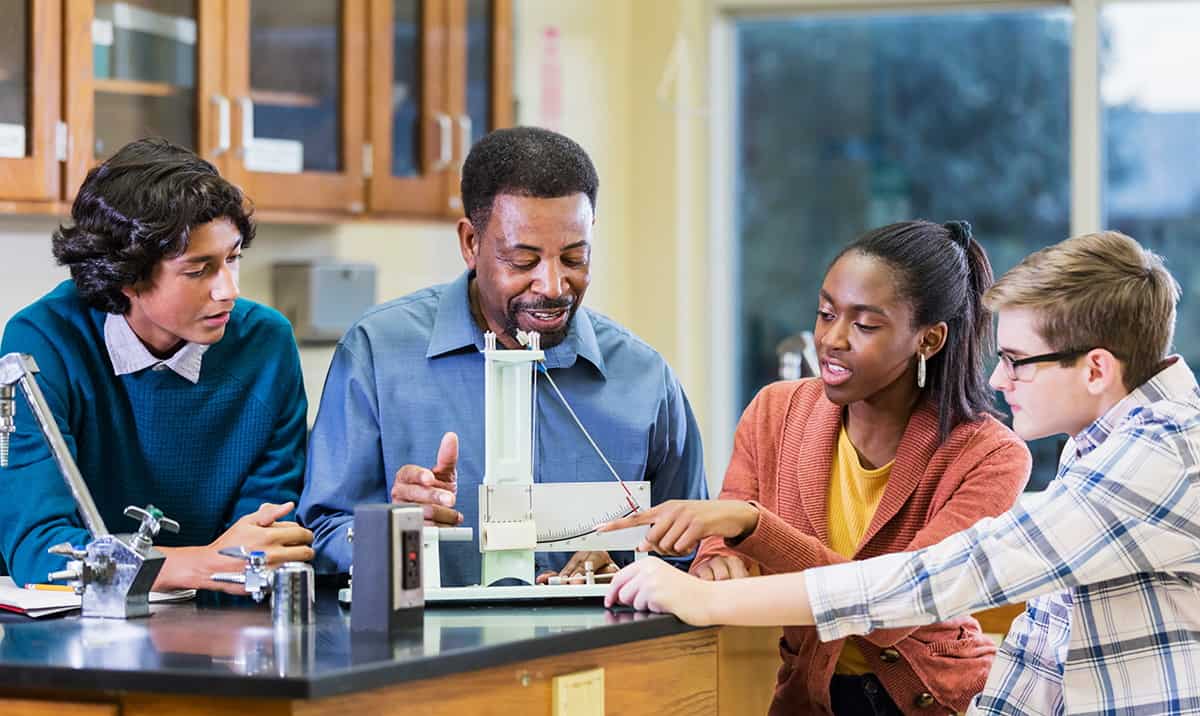Whether you’re a recent graduate or a mid-career professional, the IOP’s Teacher Training Scholarships have everything you need to bring your knowledge to the classroom and educate the physicists of the future.

As any scientist knows, there’s something uniquely delightful about grasping a new concept for the first time, but the enjoyment doesn’t have to stop there. Learning something new is often followed by an urge to share it with others, and helping them understand it can be even more fulfilling. This is something Ruth Cheesman discovered while homeschooling her children during lockdown.
“I got really interested in the cognitive science of learning,” she recalls. “We were doing marble runs across the garden and I got excited about providing that kind of hands-on lesson at home.” At that point, Cheesman had been an engineer for 18 years. But in June 2021, driven by her newfound enthusiasm, she made a snap decision to become a teacher.
Any career switch is a challenge, but Cheesman successfully applied for an Institute of Physics (IOP) Teacher Training Scholarship to help her make the transition. Funded by the Department for Education, this scholarship programme encourages talented scientists and engineers to bring their passion for physics into the classroom. In addition to a tax-free grant of £29,000, scholars have access to a plethora of teaching resources and continuing professional development (CPD) workshops throughout the year.
Beginning her training in September 2021, Cheesman made use of these benefits from the start. She found the CPD workshops particularly helpful, as they included explanations of what students often find hard to understand, and hands-on demonstrations of how to convey tricky topics.
Cheesman also found that a sense of community was invaluable in tackling a busy year of juggling assignments with learning teaching methods and behaviour management. “It’s a lot,” she says, “but there are so many people out there offering support. I’ve tapped in through the IOP and also through the EduTwitter world.”
Bringing science alive
In July this year, after finishing her training, Cheesman attended a meetup of all the IOP scholars at the National Space Centre in Leicester for a day of practical activities, like making launchers for paper rockets. “It was nice to meet likeminded people who had had similar experiences,” she says, “and the support carries on after that first training year.”
Now in her first term teaching at a sixth-form college, Cheesman still takes inspiration from the IOP workshops to be creative in the classroom. While visiting Thorpe Park one day, she brought her physics app on her phone onto the rollercoasters with her, to measure forces and accelerations. She plans to share that real-world data with her students to illustrate the physics of motion.
Scholars have access to a plethora of teaching resources and continuing professional development workshops throughout the year
Besides sharing her passion for physics, Cheesman is enjoying getting to explore topics like particle physics and cosmology, which she didn’t use as an engineer. But her previous job also helps her to emphasize the career relevance of the subject.
For other mid-career professionals thinking about a change, Cheesman says teaching is a refreshing challenge. “Release the fun within and use your passion and experience to inspire the next generation of physicists and engineers,” she says. “As a career changer I know I bring a broader insight to the classroom; I can share real stories of the applications of material science or simple harmonic oscillations and touch on where what we’re learning can take my students in the future.”
Empowering young people
For Emily Adams, who also completed her teacher training earlier this year, it is not only a passion for physics that motivates her, but also a belief in education as a powerful tool to remove barriers in society.
This is something that Adams has personal experience of, having come from an underprivileged socioeconomic background, which gave her only a 12.5% chance of going to university. While her family were very supportive, she was the first family member to pursue higher education, so she felt lucky to have teachers who helped her with the applications.
It’s cool to see my students have the penny-drop moment, and that kind of thing happens every day. It’s kind of like magic and it feels special to be part of it
Adams went on to study physics at university, and in her final year she participated in activities at local schools, such as running a session of an after-school physics club. It was her enjoyment of these activities that prompted her to apply for teacher training. “I hadn’t necessarily always planned on it,” she recalls, “but I realized I have always enjoyed sharing what I know with other people.”
Beginning her training in September 2021, Adams was also awarded an IOP scholarship and, like Cheesman, she found the workshops and resources especially useful. “They gave me loads of ideas for my lessons,” she says, “not only teaching strategies but also really practical things that I could show my students in class, to help them engage with those big ideas in physics.”

Physics for all
Having enjoyed training at her main placement school, Adams is now a teacher there, and continues to find it rewarding. “It’s cool to see my students have the penny-drop moment,” she says, “and that kind of thing happens every day. It’s kind of like magic and it feels special to be part of it.”
Adams continues to make the most of the scholarship resources, including the physics magazines and booklets about influential scientists that the IOP sends her. She finds that the information about these scientists and their life stories helps to bring lessons alive, turning them into a story of discovery, rather than a lecture.
Besides the IOP’s workshops on teaching specific topics, Adams also appreciated their CPD sessions about the importance of improving diversity in physics. This is particularly pertinent to her as a teacher in a girls’ school with students from many different cultural backgrounds. And as a young woman she wants to show her students that the subject is for them as much as for anyone else.
For physics students considering a career in the classroom, Adams recommends applying for opportunities to try it out, like the after-school club she ran a session of during university. “Teaching lets me share what I am passionate about with young people every day and provide opportunities for students who come from marginalized backgrounds like me to get involved with STEM,” she explains. “I would say it’s the best thing I could have done with my degree.”
Has this article inspired you to consider a career in teaching? Take our short survey and tell us your views.




